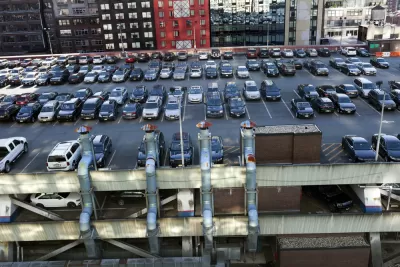The New York Department of City Planning is working on an overhaul of its parking requirements with the potential to impact hundreds of developments.

Kelly Weill and Ryan Hutchins start their discussion of New York City parking requirements by noting that the Hudson Yards, "the largest private real estate development in American history," will add a relatively small number of parking spaces.
"That anything of this scale—and built near the Lincoln Tunnel and the West Side Highway—would eschew parking in this way is a clear testament to how much New York City has changed. As public transit options expand, and millennials continue to skew trends away from car ownership, the necessity for buildings to supply parking is dwindling."
But the parking model presented by that controversial project is not one that can be readily reproduced according to the zoning regulations found around most of the city: "The city still requires most outer borough and upper-Manhattan builders to provide approximately one off-street parking space for every two units of housing."
The article cites Juliette Michaelson, vice president for strategy at the Regional Plan Association, to make the case for new thinking regarding the city's parking requirements:
"These rules are from a time when people thought it was the government’s role to encourage driving…In a time when we have a huge demand for housing, but are trying to reduce driving and therefore parking, eliminating a minimum parking requirement could be a big deal."
Michaelson's argument has found support from New York City Mayor Bill de Blasio's administration, which recently proposed a new set of zoning requirements that, according to Weill and Hutchins, would end "parking requirements for new low-income, inclusionary and affordable senior housing units that are within a half-mile of mass transit. It would also reduce those parking requirements on mixed-income housing where it would benefit the construction of affordable units."
An article by Stephen Smith for New York YIMBY notes that the proposal already has its detractors in the form of affordable housing advocates who doubt that the savings to developers will be passed on to residents.
FULL STORY: As parking needs fall, City Hall weighs reduced requirements

Maui's Vacation Rental Debate Turns Ugly
Verbal attacks, misinformation campaigns and fistfights plague a high-stakes debate to convert thousands of vacation rentals into long-term housing.

Planetizen Federal Action Tracker
A weekly monitor of how Trump’s orders and actions are impacting planners and planning in America.

In Urban Planning, AI Prompting Could be the New Design Thinking
Creativity has long been key to great urban design. What if we see AI as our new creative partner?

King County Supportive Housing Program Offers Hope for Unhoused Residents
The county is taking a ‘Housing First’ approach that prioritizes getting people into housing, then offering wraparound supportive services.

Researchers Use AI to Get Clearer Picture of US Housing
Analysts are using artificial intelligence to supercharge their research by allowing them to comb through data faster. Though these AI tools can be error prone, they save time and housing researchers are optimistic about the future.

Making Shared Micromobility More Inclusive
Cities and shared mobility system operators can do more to include people with disabilities in planning and operations, per a new report.
Urban Design for Planners 1: Software Tools
This six-course series explores essential urban design concepts using open source software and equips planners with the tools they need to participate fully in the urban design process.
Planning for Universal Design
Learn the tools for implementing Universal Design in planning regulations.
planning NEXT
Appalachian Highlands Housing Partners
Mpact (founded as Rail~Volution)
City of Camden Redevelopment Agency
City of Astoria
City of Portland
City of Laramie



























